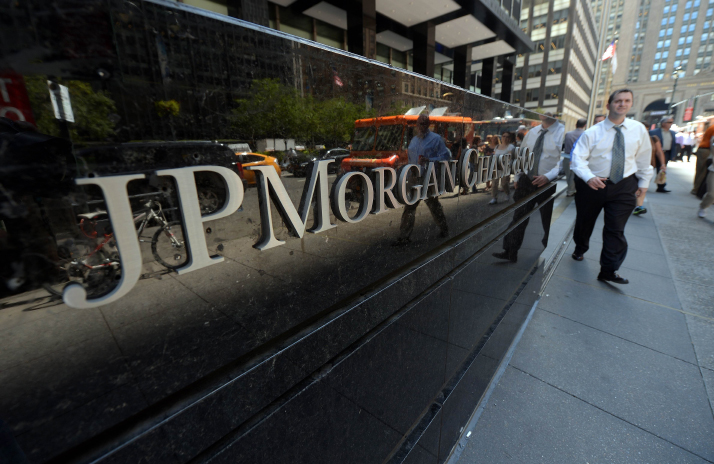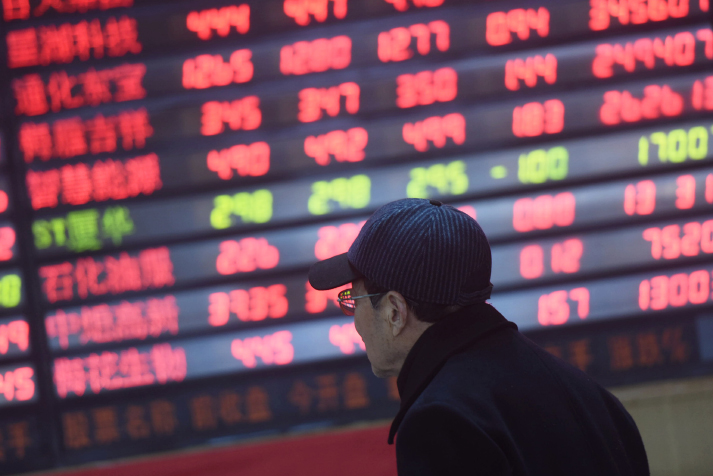| Business |
| A Capital Opportunity | |
| Limits on foreign ownership of securities firms scrapped to open up financial industry wider | |
|
|
 J.P. Morgan's headquarters in New York, the United States (XINHUA)
To quicken opening up the financial industry to foreign investors, the Chinese authorities scrapped the limits on foreign ownership in securities and fund management firms on April 1, bringing cheer to foreign companies seeking to set up wholly owned subsidiaries on the Chinese mainland. Alicia Garcia Herrero, chief economist for Asia Pacific at French investment bank Natixis, told CGTN, "It's very good news for the world because we are in the process of disintegration, deglobalization, which is being sped up by the coronavirus… So any measure to open up any country, especially China, is absolutely welcome." Initially, the authorities had planned to lift foreign ownership limits on brokerages, fund management firms and futures companies in 2021 but then fastforwarded the financial opening up. Eligible foreign investors can now apply to register new securities firms or change the actual controller of existing ones in line with the laws and regulations, the China Securities Regulatory Commission (CSRC) said. Before that, the mainland had already seen five foreign-owned and 10 joint-venture (JV) securities firms in the market, of which the first wholly foreign-funded securities firm is expected to emerge after the removal of the limits. By March 30, another 18 JV securities firms were waiting for approval, according to the CSRC. Liu Feng, chief economist of China Galaxy Securities in Beijing, told Securities Journal the measure will attract large international financial institutions to China's capital market, who will bring in advanced technologies, experience and talents. The presence of foreign-funded financial institutions will also spur Chinese companies to improve their weak points to cope with competition. Consequently, investors will have more and better choices in products and services. Competition ahead Before 2012, foreign securities firms could hold maximum 33 percent in their JVs in China. It was raised to 51 percent in 2018, as the CSRC decided to allow foreign investors a controlling stake. Switzerland-based UBS, U.S. J.P. Morgan and Japan's Nomura Orient International Securities obtained approval to take majority stakes in Chinese securities firms last year. Another two U.S.-based financial institutions, Morgan Stanley and Goldman Sachs, obtained CSRC approval this year to improve their shares in their China securities JVs to 51 percent. Mark Leung, CEO of J.P. Morgan Securities (China), told China Radio International that China's steady economic growth and its increasingly open capital market will benefit his company in the long term. Dong Dengxin, Director of the Finance and Securities Institute at Wuhan University of Science and Technology, told Beijing Review the cancellation of the restrictions, while attracting foreign securities firms, will also help Chinese companies go global and improve the quality and efficiency of the securities industry's services in China. Yan Hong, a professor with Shanghai Jiao Tong University, emphasized the competition factor. "The opening up of the securities industry will generate more competition on initial public offerings (IPOs) and services on trading and assets management, where foreign securities enterprises show more edge and experience," Yan told International Finance News. According to Yan, domestic securities firms face intensified competition. They need to float IPOs and trading services while improving the weak points in their management models, incentive mechanisms and risk management before more foreign players enter the playing field.  An investor checks stock price changes at a securities business hall in Hangzhou, Zhejiang Province in east China, on January 2. Red means up and green means down in Chinese stock markets (XINHUA)
Steady reforms Since last year, the authorities have introduced a slew of policies and measures to open up the capital market. In 2019, the investment quota limits for qualified foreign institutional investors and renminbi qualified foreign institutional investors were removed, allowing foreign investors greater participation in the financial market. To boost foreign capital in the stock market, especially in hi-tech enterprises, the science and technology innovation board was opened in Shanghai last June. The Shanghai-London Stock Connect program, linking the London and Shanghai stock exchanges so that companies listed on one can trade on the other, began operation. Also, the Shanghai Stock Exchange and the Japan Exchange Group signed an agreement last April to facilitate access to the exchange traded funds (ETFs) markets in both countries. Chinese fund managers' applications to register ETF products for cross-investment with Japan also began to be approved. In addition, China's A-shares were given increased weightage on global indexes such as the New York-based MSCI and British FTSE Russell. According to State Administration of Foreign Exchange (SAFE) figures in March, the net inflow of foreign securities investment in 2019 stood at $147.4 billion. This included $102.5 billion of net overseas bond investment, a record high showing a 3-percent year-on-year increase. Also, data from the China Foreign Exchange Trading Center showed that 2,608 overseas institutional investors had invested in the Chinese inter-bank bond market by the end of 2019. Overseas institutions held 2.19 trillion yuan ($308 billion) of renminbi bonds last year, up 457.8 billion yuan ($64 billion) from the previous year. The government has continued the efforts this year. On January 1, ownership restrictions on futures companies were lifted, making the futures market the first sector in the financial industry to allow wider access for foreign capital. The new Foreign Investment Law came into effect the same day, addressing foreign investors' concerns about technology transfer, intellectual property protection and a level playing field vis-a-vis domestic players. Also in January, the Ministry of Finance eased restrictions on the qualifications of wholly foreign-funded banks, JV banks and branches of foreign banks to participate in underwriting local government bonds in a bid to expand bond issuance channels. The revised Securities Law that came into effect on March 1 has made listing of companies in the A-share market easier by expanding the registration-based IPO system. According to He Nanye, a researcher with Suning Financial Research Institute, the research arm of e-commerce giant Suning, the opening-up efforts this year will focus on widening access for foreign investors, promoting the inclusion of A-shares on global indexes, and loosening outbound capital flow to realize the free flow of foreign capital. The regulators will also improve connectivity between domestic and international capital markets, supporting leading Chinese enterprises to float stocks and bonds on foreign stock exchanges and attracting foreign enterprises to the Chinese market for financing, He told Securities Daily. "China now has the world's second largest bond and stock markets, but foreign investors hold only about 3 to 4 percent of Chinese bonds and stocks. The shares remain to be improved through further opening up the capital market," Wang Chunying, a spokesperson of SAFE, said at a press conference in January. Future outlook As the pandemic spreads, it may continue to affect the capital markets in countries that have not yet seen the outbreak peak, dampening local securities firms' enthusiasm to expand business, Zhao Yongchao, acting Dean of the Financial Research Institute of the Shanghai-based Hualue Think-Tank, told International Finance News. Slow business will also make foreign enterprises more cautious about doing business in China. However, the impacts will be temporary for China's capital market, which remains appealing to foreign investors. According to Zhao, the registration-based IPO system can make the market more attractive to global investors. Moreover, while the economic growth of European countries and the United States has slowed down, renminbi assets have more appeal for investors around the world. Li Zhan, chief economist of Zhongshan Securities in south China, told Securities Daily that China's stable economic growth will ensure long-term investment returns. The current price-earnings ratio of Chinese A-shares is significantly lower than that of other stocks, such as U.S. ones, making the Chinese A-share market attractive for investment in the medium and long term. The returns on some high-quality domestic assets are also higher than the world average. "China's capital market has seen systematic reform with many mechanisms improved. The A-share market is becoming more market-oriented, law-based and standard, which is expected to see further development and become one of the most active major capital markets in the world," He said. Copyedited by Sudeshna Sarkar Comments to lixiaoyang@bjreview.com |
|
||||||||||||||||||||||||||||||
|